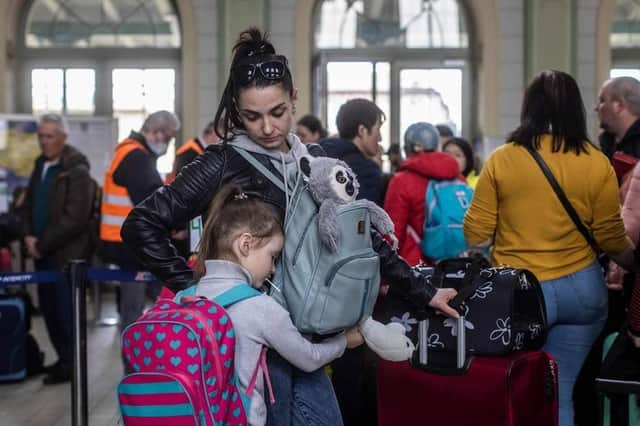Government ‘needs a plan’ as Ukrainian host families asked to extend stays


In a UK Government survey sent out to hosts last month asking about their experience of their participation in the Homes for Ukraine visa scheme, one of the questions asks if a host would be interested in turning their arrangement into a formal tenancy agreement.
Under the regulations set out when the visa scheme was launched, hosts were asked to offer their guest a home for a minimum of six months. Some of the Ukrainian refugees who came over shortly after the scheme began in March, are now coming towards the end of that period and are having to look for a more permanent arrangement.
Advertisement
Hide AdAdvertisement
Hide AdOne host from Edinburgh, who has hosted a mother and five year old child from Ukraine since May, said: “The government refuses to acknowledge that this war will last quite some time – they need to arrange some proper, more permanent form of accommodation for Ukrainian refugees here.
"One of the questions snuck into the survey I got sent is whether I’d want to change the arrangement to rental – which I do not, as I have no interest in being a landlord and neither do my guest and her daughter have an interest in living in an arrangement like this on a more permanent basis."
She added: “The authorities do need to do something about this scheme sooner rather than later, as the first people would have arrived on it almost four months ago, and we all signed up to 'at least six months' which in legal teams is equivalent to 'no more than six months'.
"It is my guest’s dream to have a job and be able to afford her own flat and when she arrived she thought she’d be able to do that by August, but of course it was a bit unrealistic which she’s realising now. She has told me that many people she knows are very worried about all the uncertainties about accommodation and already some are worried their hosts will kick them out once six months are over and they’ll end up in homeless shelters.”
Scottish Liberal Democrat leader Alex Cole-Hamilton said: "Many thousands of Scots have generously opened their homes to host refugees from Ukraine. They did so under the understanding that these were temporary arrangements while the government secured more permanent accommodation and people got on their feet.
"I imagine most Ukrainians would much rather have their own spaces and the opportunity to get on with their lives too.”
He added: "The government's failure to get their ducks in a line risks scaring people off from taking part in the host scheme and driving a wedge between the Scottish public and their guests. There is a widening gulf between the promises made by the Scottish and UK governments and the reality on the ground."
In an email sent to hosts alongside the survey link, the Home Office said: “In this study, we would like to hear about your views on taking part in the Homes for Ukraine sponsorship scheme. This includes understanding your motivation for getting involved, your experiences so far, as well as your intentions beyond the initial six-month period of sponsorship.”
Advertisement
Hide AdAdvertisement
Hide AdA UK Government spokesperson said the questions on the ONS survey do not reflect or pre-empt government policies or plans.
She said: “Sponsors are the backbone of the Homes for Ukraine scheme and their generosity has helped over 72,700 Ukrainians find safety here in the UK.
“We have asked sponsors to host for a minimum of six months and are working closely with councils to ensure Ukrainians have access to suitable housing if they decide to move on. Arrivals are able to work and apply for benefits from day one.”
Comments
Want to join the conversation? Please or to comment on this article.
